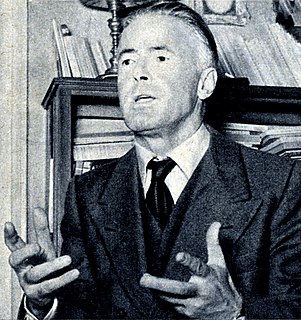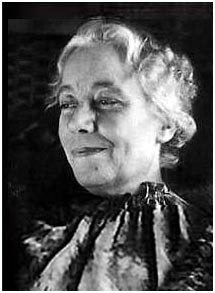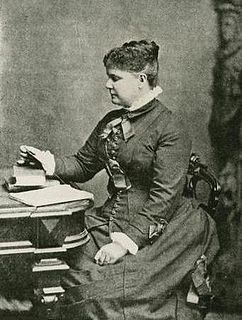A Quote by Ferdinand de Saussure
Psychologically our thought-apart from its expression in words-is only a shapeless and indistinct mass.
Quote Topics
Related Quotes
Poetry is creative expression; Prose is constructive expression... by creative I mean original. In Poetry the words are born or reborn in the act of thinking... There is no time interval between the words and the thought when a real poet writes, both of them happen together, and both the thought and the word are Poetry.
It is probably impossible to think without words, but if we permit ourselves to think with the wrong words, we shall soon be entertaining erroneous thoughts; for words, which are given us for the expression of thought, have a habit of going beyond their proper bounds and determining the content of thought.
The trick is to keep exploring and not bail out, even when we find out that something is not what we thought. That's what we're going to discover again and again and again. Nothing is what we thought. I can say that with great confidence. Emptiness is not what we thought. Neither is mindfulness or fear. Compassion––not what we thought. Love. Buddha nature. Courage. These are code words for things we don't know in our minds, but any of us could experience them. These are words that point to what life really is when we let things fall apart and let ourselves be nailed to the present moment.
There is one tradition in America I am proud to inherit. It is our first freedom and the truest expression of our Americanism: the ability to dissent without fear. It is our right to utter the words, 'I disagree.' We must feel at liberty to speak those words to our neighbors, our clergy, our educators, our news media, our lawmakers and, above all, to the one among us we elect - President.
He was beautiful, that was always affirmed, but his beauty was hard to fix or to see, for he was always glimmering, flickering, melting, mixing, he was the shape of a shapeless flame, he was the eddying thread of needle-shapes in the shapeless mass of the waterfall. He was the invisible wind that hurried the clouds in billows and ribbons. You could see a bare tree on the skyline bent by the wind, holding up twisted branches and bent twigs, and suddenly its formless form would resolve itself into that of the trickster.
Once upon a time ... the only autonomous intelligences we humans knew of were us humans. We thought then that if humankind ever devised another intelligence that it would be the result of a huge project ... a great mass of silicon and ancient transistors and chips and circuit boards ... a machine with lots of networking circuits, in other words, aping-if you will pardon the expression-the human brain in form and function. Of course, AIs did not evolve that way. They sort of slipped into existence when we humans were looking the other way.
There's often a distressing disconnect between the good words we speak and the way we live our lives. In personal relations and politics, the mass media, the academy and organized religion, our good words tend to float away even as they leave our lips, ascending to an altitude where they neither reflect nor connect with the human condition. We long for words like love, truth, and justice to become flesh and dwell among us. But in our violent world, it's risky business to wrap our frail flesh around words like those, and we don't like the odds.
The Second Wave Society is industrial and based on mass production, mass distribution, mass consumption, mass education, mass media, mass recreation, mass entertainment, and weapons of mass destruction. You combine those things with standardization, centralization, concentration, and synchronization, and you wind up with a style of organization we call bureaucracy.
When we can't hold back, or set boundaries, on what comes from our lips, our words are in charge-not us. But we are still responsible for those words. Our words do not come from somewhere outside of us, as if we were a ventriloquist's dummy. They are the product of our hearts. Our saying, "I didn't mean that," is probably better translated, "I didn't want you to know I thought that about you." We need to take responsibility for our words. "But I tell you that men will have to give account on the day of judgment for every careless word they have spoken" (Matt. 12:36).




































